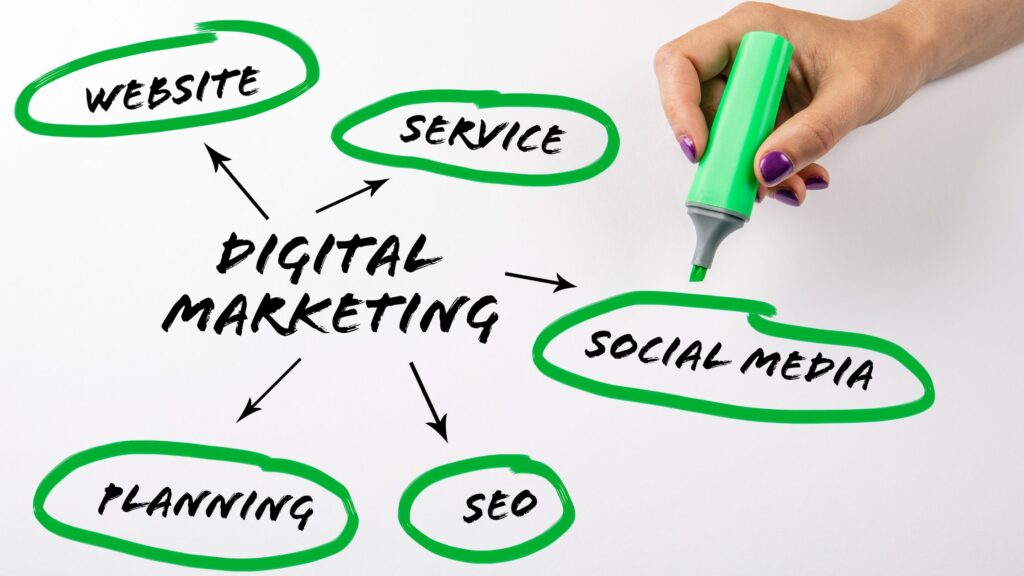Introduction
In the labyrinth of digital marketing possibilities, how to choose a digital marketing agency—it’s a strategic imperative. The success or stagnation of your business hinges on this crucial decision. Let’s embark on a journey to unravel the secrets of selecting the perfect digital marketing partner.
Brief overview of the importance of selecting the right digital marketing agency:
The digital realm is a bustling marketplace, and navigating it requires a seasoned guide. Selecting the right digital marketing agency isn’t just about ticking off a checklist—it’s about unlocking a pathway to unparalleled growth and success.
The impact of a strategic marketing partner on business growth
Imagine a partner who not only understands your business goals but propels them forward. A strategic marketing ally isn’t just an expense; it’s an investment in accelerated growth. This section will delve into the transformative impact a well-chosen agency can have on your business landscape.
Setting the stage for the key considerations in the decision-making process
Now that we’ve established the stakes, it’s time to set the stage for the decision-making process. We’re about to embark on a journey where each step is pivotal. From understanding your business goals to scrutinizing contracts, every move is a piece in the puzzle of finding your ideal digital marketing companion.
Understanding Your Business Goals
Defining your business objectives and marketing goals:
This component emphasizes the foundational step of clearly outlining your business objectives and marketing goals.
Define what success looks like for your business in the short and long term. These goals could include revenue targets, market share expansion, or brand positioning objectives.
By having a clear understanding of your overarching business goals, you set the stage for aligning marketing strategies with these objectives.

Identifying specific areas of focus (e.g., brand awareness, lead generation, conversion optimization):
Here, you delve into the specific facets of your business that require attention.
Identify key areas where digital marketing can play a crucial role. This might involve enhancing brand visibility, generating leads, optimizing conversion rates on your website, or addressing specific challenges unique to your industry.
Each business will have distinct priorities, and this step ensures that your chosen digital marketing agency can tailor their strategies to meet these specific needs.
Discussing the importance of aligning agency expertise with your business needs:
This part underscores the critical need for synergy between your business requirements and the expertise of the digital marketing agency.
Discuss the significance of choosing an agency that not only offers a broad range of services but has a proven track record in the specific areas relevant to your goals.
By aligning the agency’s expertise with your business needs, you increase the likelihood of successful collaboration, as the agency brings specialized knowledge and experience to the table.
In essence, this section is all about establishing a solid foundation for the digital marketing journey by clarifying your business goals, pinpointing specific focus areas, and ensuring that the chosen agency has the expertise needed to address those unique challenges and objectives. It’s the initial strategic step that informs the subsequent decision-making process when selecting a digital marketing agency.
Researching Potential Agencies
Exploring different types of digital marketing agencies (full-services):
This component focuses on understanding the various types of digital marketing agencies available in the market.
Explore the distinctions between full-service agencies that offer a comprehensive suite of services, specialized agencies that focus on specific areas (e.g., SEO, social media),that provide personalized and niche services.
Each type has its advantages and may suit different business needs, so it’s essential to explore and understand these distinctions before making a decision.

Utilizing online resources, reviews, and testimonials for initial screening:
This part underscores the importance of leveraging the vast information available online for preliminary assessments.
Utilize search engines, industry directories, and social media platforms to identify potential agencies. Look for reviews and testimonials from past clients to gauge the agency’s reputation, reliability, and the quality of their services. This initial screening helps you create a shortlist of agencies worthy of further consideration.
Seeking recommendations and referrals from industry peers:
Word of mouth is a powerful tool in the decision-making process. This step encourages reaching out to peers and colleagues in your industry for their insights.
Seek recommendations from those who have firsthand experience with digital marketing agencies. Their perspectives can offer valuable insights into the strengths, weaknesses, and overall performance of potential agencies.
Personal referrals often provide a level of trust and confidence that can be crucial in the decision-making process.
In summary, this section emphasizes the importance of a thorough and diverse research approach when exploring potential digital marketing agencies. By understanding the different agency types, using online resources for screening, and seeking recommendations from industry peers, you can gather valuable information that will inform your decision-making process and lead you to an agency that aligns with your business goals and preferences.
Evaluating Expertise and Experience
Assessing the agency’s track record and portfolio:
This part emphasizes the importance of examining the agency’s historical performance and portfolio.
Assess the agency’s track record by looking at their past projects and campaigns. Consider factors like the success of these initiatives, the impact on client goals, and any notable achievements. The portfolio is a tangible representation of the agency’s capabilities and can provide insights into their style, creativity, and effectiveness.
Examining case studies and success stories related to your industry:
Dive deeper into the agency’s expertise by examining case studies and success stories that are relevant to your industry.
Assess how the agency has tackled challenges similar to yours and the results they achieved. This step provides a more tailored understanding of how the agency can specifically contribute to your business goals.
Industry-specific success stories demonstrate the agency’s ability to navigate the nuances of your market.
. Ensuring the agency’s team has expertise in relevant digital marketing channels (SEO, PPC, social media, content marketing):
This part focuses on ensuring that the agency’s team possesses the right skill set in key digital marketing channels.
Evaluate the expertise of the team in areas crucial to your business, such as Search Engine Optimization (SEO), Pay-Per-Click (PPC) advertising, social media management, and content marketing.
A well-rounded team with specialized skills in these areas ensures a comprehensive approach to your digital marketing strategy, addressing multiple facets of online visibility and audience engagement. In summary, this section guides you through the process of evaluating an agency’s expertise and experience by examining their track record, industry-specific case studies, and the proficiency of their team in essential digital marketing channels. This comprehensive assessment ensures that the chosen agency not only has a proven history of success but also possesses the specific skills needed to propel your business towards its goals.
Transparency and Communication
Emphasizing the importance of clear communication channels:
This component underscores the foundational role of communication in a successful agency-client partnership.
Emphasize the importance of establishing clear and open communication channels from the outset. Effective communication ensures that both parties are on the same page, understanding goals, expectations, and timelines.
Clarity in communication fosters a positive working relationship, minimizing misunderstandings and maximizing the impact of collaborative efforts.

Evaluating the agency’s transparency in reporting and analytics:
This part focuses on the agency’s commitment to transparency in providing insights into their performance.
Evaluate the agency’s reporting and analytics practices. A transparent agency will provide regular, detailed reports on key performance indicators (KPIs), allowing you to track the effectiveness of campaigns. Transparency in reporting builds trust and allows you to make informed decisions based on real-time data and analytics.
Discussing the role of regular updates and strategy reviews in the partnership:
Regular updates and strategy reviews are essential elements for keeping the partnership dynamic and aligned with evolving business goals.
Discuss the frequency and format of updates with the agency. Regular communication ensures that you stay informed about ongoing campaigns, results, and any adjustments made to the strategy.
Strategy reviews provide an opportunity to assess the effectiveness of current approaches, make necessary adjustments, and align future efforts with the evolving needs of your business. In summary, this section highlights the pivotal role of transparency and communication in a successful collaboration with a digital marketing agency. Emphasizing clear communication channels, evaluating transparency in reporting, and discussing the importance of regular updates and strategy reviews set the groundwork for a partnership built on trust, understanding, and the ability to adapt to changing circumstances.
Budget Considerations
Establishing a realistic budget for digital marketing efforts:
This component emphasizes the need to define a clear and realistic budget for your digital marketing initiatives.
Assess your financial capacity and determine the amount you are willing to allocate to digital marketing. A well-defined budget sets boundaries and guides the agency in tailoring strategies that align with your financial resources. The goal is to establish a budget that is both realistic and capable of supporting effective digital marketing campaigns.
Exploring pricing models and fee structures of potential agencies:
This part guides you in understanding the financial dynamics of potential digital marketing agencies.
Explore the pricing models and fee structures offered by different agencies. Some may work on a retainer basis, while others may charge per project or utilize a performance-based model.
Understanding the agency’s pricing structure helps you align their services with your budget and ensures transparency in financial expectations.
Balancing cost considerations with expected return on investment (ROI):
The section encourages you to view the budget as an investment and emphasizes the importance of balancing costs with expected returns.
Consider the potential return on investment (ROI) for the proposed digital marketing strategies. While cost considerations are crucial, they should be weighed against the anticipated benefits and impact on your business goals.
Striking a balance ensures that your investment in digital marketing aligns with your business objectives and yields a positive ROI over time.
In summary, this section is about approaching the financial aspect of selecting a digital marketing agency strategically. By establishing a realistic budget, exploring agency pricing models, and balancing cost considerations with expected ROI, you create a financial framework that not only aligns with your resources but also ensures that the investment in digital marketing contributes meaningfully to the growth and success of your business.
Client-Agency Compatibility
Assessing cultural fit and shared values:
This component focuses on evaluating the compatibility between your company’s culture and values and those of the digital marketing agency.
Assess whether the agency’s culture aligns with your organizational values. A shared understanding of values can foster a more harmonious working relationship and ensure that both parties are working towards common goals.
Cultural fit is not just about skills but about shared principles and approaches to business.
Considering the size and scale of the agency in relation to your business:
This part guides you in assessing the size and scale of the agency and how it aligns with the needs and scale of your business.
Consider whether the agency’s size matches your business requirements. A smaller boutique agency may provide a more personalized touch, while a larger agency might offer a broader range of services.
Ensure that the agency’s capacity aligns with your business demands, preventing potential mismatches in terms of attention, resources, and responsiveness.
Addressing potential conflicts of interest and ensuring mutual understanding:
This section emphasizes the need to address potential conflicts of interest and establish a mutual understanding from the beginning.
Openly discuss any potential conflicts of interest that might arise during the partnership. This could include working with competitors or engaging in projects that may pose a conflict with your business goals.
Establish clear expectations and ensure mutual understanding on aspects like project timelines, deliverables, and key performance indicators (KPIs) to avoid misunderstandings down the line.
In summary, this section is all about ensuring a harmonious and mutually beneficial partnership between your business and the digital marketing agency. By assessing cultural fit and shared values, considering the size and scale of the agency in relation to your business, and addressing potential conflicts of interest, you set the foundation for a partnership built on understanding, collaboration, and shared goals.

Contracts and Agreements
Understanding the terms of service and contractual obligations:
This component emphasizes the importance of thoroughly understanding the terms of service and contractual obligations presented by the digital marketing agency.
Carefully review the contract to ensure clarity on services, deliverables, timelines, and any legal aspects. Understanding the terms helps prevent misunderstandings and ensures both parties are on the same page regarding expectations and responsibilities.
This step is crucial for establishing a solid foundation for the partnership and avoiding potential disputes in the future.
Discussing flexibility in adapting to evolving business needs:
This part guides you to discuss the flexibility of the agency in adapting to the evolving needs of your business.
Acknowledge that business landscapes are dynamic, and flexibility is key. Discuss how the agency can accommodate changes in strategy, shifts in priorities, or unexpected challenges that may arise during the course of the partnership.
Establishing a clear understanding of how the agency handles adaptability ensures a more agile and responsive collaboration.
Securing a clear exit strategy if the partnership doesn’t meet expectations:
This section emphasizes the importance of having a clear exit strategy in case the partnership does not meet expectations.
Discuss and document the terms under which either party can terminate the agreement. This includes the process, notice period, and any potential financial implications.
Having a clear exit strategy provides both parties with a defined process for parting ways amicably if the collaboration is not delivering the expected results.
In summary, this section is about setting up a solid contractual framework that promotes understanding, flexibility, and clarity in case the partnership needs to be adjusted or terminated. By understanding the terms, discussing flexibility, and securing a clear exit strategy, you establish a contractual foundation that supports a transparent and adaptable partnership with the digital marketing agency.
FAQ about how to choose a Digital Marketing Agency
Why is choosing the right digital marketing agency crucial for my business?
Selecting the right agency can significantly impact your business growth by implementing effective strategies tailored to your goals, increasing brand visibility, and driving targeted results.
How do I determine my business goals before choosing a digital marketing agency?
Clearly define your business objectives, whether it’s boosting brand awareness, generating leads, or optimizing conversions. Knowing your goals guides the selection of an agency aligned with your aspirations.
What are the different types of digital marketing agencies, and how do I choose the right one for my business?
Explore full-service, specialized, and boutique agencies. Choose based on your business needs and preferences – whether you require comprehensive services, niche expertise, or personalized attention
How can I research potential digital marketing agencies effectively?
Utilize online resources, read reviews and testimonials, and seek recommendations from industry peers. This multifaceted approach helps in creating a shortlist of agencies worthy of further consideration.
Why is assessing an agency’s track record and portfolio important?
Evaluating past performance provides insights into an agency’s capabilities and success in achieving goals. A strong portfolio demonstrates their expertise and compatibility with your business needs.
What role does transparency play in the client-agency relationship?
Transparency is essential for clear communication. It involves open channels, honest reporting, and regular updates, fostering trust and ensuring you stay informed about the progress of your digital marketing efforts.
How do I establish a realistic budget for digital marketing?
Determine your financial capacity and explore different pricing models of potential agencies. Strive to strike a balance between budget constraints and expected return on investment (ROI) for effective digital marketing strategies.
Why is client-agency compatibility crucial for a successful partnership?
A compatible partnership ensures harmonious collaboration. Assess cultural fit, consider agency size in relation to your business, and address potential conflicts of interest to establish a mutually beneficial relationship.
What should I look for in digital marketing agency contracts and agreements?
Understand terms of service, discuss flexibility in adapting to evolving needs, and secure a clear exit strategy. A well-crafted contract ensures both parties are aligned, adaptable, and have a defined process for any necessary adjustments.
How do I know when it’s time to consider ending a partnership with a digital marketing agency?
Regularly evaluate performance against expectations. If the agency consistently falls short, discuss concerns openly, and refer to the exit strategy outlined in the contract if necessary.
Conclusion:
In the digital realm, choosing the right agency isn’t just a decision; it’s a strategy. By understanding your business goals, researching potential agencies, evaluating expertise, ensuring transparency, managing budgets, fostering compatibility, and solidifying contracts, you’re not just selecting an agency—you’re forging a path to unparalleled growth and success.

